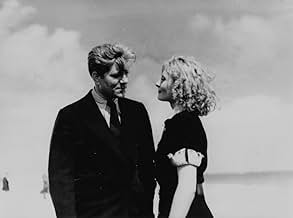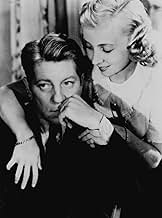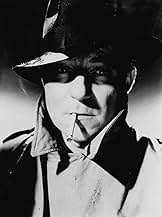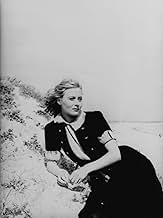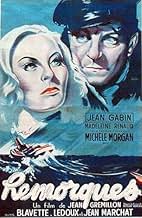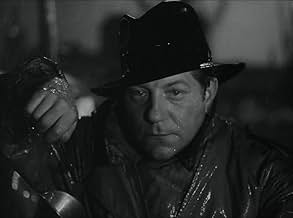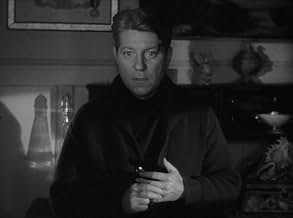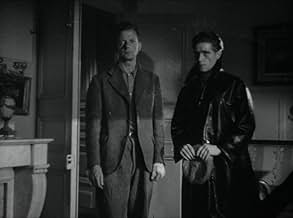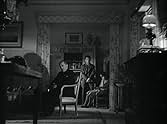IMDb-BEWERTUNG
7,2/10
1723
IHRE BEWERTUNG
André Laurent, der Kapitän eines Schleppers, heiratete Yvonne vor zehn Jahren. Sie hat eine Herzkrankheit, will es ihm aber nicht sagen. Sie träumt davon, dass er den Job kündigt, damit sie ... Alles lesenAndré Laurent, der Kapitän eines Schleppers, heiratete Yvonne vor zehn Jahren. Sie hat eine Herzkrankheit, will es ihm aber nicht sagen. Sie träumt davon, dass er den Job kündigt, damit sie ruhig leben können.André Laurent, der Kapitän eines Schleppers, heiratete Yvonne vor zehn Jahren. Sie hat eine Herzkrankheit, will es ihm aber nicht sagen. Sie träumt davon, dass er den Job kündigt, damit sie ruhig leben können.
Madeleine Renaud
- Yvonne Laurent
- (as Madeleine Renaud de la Comédie Francaise)
Charles Blavette
- Gabriel Tanguy
- (as Blavette)
Jean Dasté
- Le radio
- (as Jean Daste)
René Bergeron
- Georges
- (as Bergeron)
Henri Poupon
- Le docteur Maulette
- (as Poupon)
Marcel Pérès
- Le Meur
- (as Perez)
Marcel Duhamel
- Pierre Poubennec
- (as Duhamel)
Henri Pons
- Roger
- (as Pons)
Léonce Corne
- Un invité à la noce
- (Nicht genannt)
Lucien Coëdel
- Un marin du 'Cyclope'
- (Nicht genannt)
Henri Crémieux
- L'administrateur
- (Nicht genannt)
Empfohlene Bewertungen
Jean Gabin stars as the captain of a tugboat. On a job, he rescues Michele Morgan. Later, they begin a romance, though Gabin is married to the lovable but perpetually worried Madeleine Renaud. This is a pretty good film, though it has some major flaws. The scenes in the stormy seas (which is what the title literally means) look particularly great for the time. The major flaw, as I see it, is that the relationship between Morgan and Gabin just happens too quickly, and is thus not that believable. In the scenes between Gabin and Renaud, their relationship seems so wonderful and loving that it's hard to believe he'd dump her so quickly - like later the same day, pretty much. The film's finale is quite powerful. The performances throughout are excellent, especially Gabin's. Jacques Prevert co-wrote the script.
A simple story. at first sigh, too simple. because it could seems be well known. but not the love story is the axis. but the atmosphere. the performances. the ocean. the mixture of duty, romance and clash against reality. the strange beauty of the meet between Morgan and Gabin after "Quai des brues"). and, sure, the moving end. a film who remains bitter -seductive against the decades. for its remarkable simplicity. for admirable performances. and for reasons escaping to precise definition.
There are films whose production could be a good subject for a film script. One of these cases seems to me to be 'Remorques' (the English distribution title was 'Stormy Waters'). The director of this film was Jean Grémillon, a very interesting filmmaker, a documentarist and a musician as well, an artist involved in the anti-Nazi resistance but also the author of several films produced and distributed during the occupation. These films could be the subject of a case study on the art of cinema under conditions of occupation and war, on the boundaries between dignity and collaboration under conditions of censorship. 'Remorques' is one of them. Filming began in the summer of 1939 and was interrupted by the outbreak of war, when Jean Gabin and other members of the film crew were called up in the army. Continuing in 1940, filming was interrupted again with the fall of Paris, to be completed in 1941. The film was first distributed in occupied France, with the approval of German censorship, although its stars, Jean Gabin and Michèle Morgan had meanwhile taken refuge in America. The international premiere did not take place until after the war, in 1946. Beyond this interesting history, 'Remorques' is a film with many qualities that make it stand the test of time and remain relevant over 80 years after its production.
The screenplay written by André Cayatte and Jacques Prévert, who adapted a novel by Roger Vercel for the screen, offers us a story that takes place on the ocean and on the shores of the (Atlantic) ocean which plays an important role. André Laurent, the film's main hero, is the captain of a tugboat which rescues and tows boats in distress during storms on the ocean. In such a situation, he meets Catherine, the wife of the captain of another ship, who decides to leave her husband. The romance that develops between André and Catherine endangers André's career as a seafarer dedicated to saving others and the marriage to his faithful wife Yvonne.
The romantic story is quite banal, but the film is interesting because of the way it is conceived visually and, of course, by the presence of two of the most formidable French actors of that period. Jean Gabin and Michèle Morgan had already worked together in Marcel Carné's 'Le quai des brumes' and the producers bet correctly by casting the two actors in the main roles. It is fascinating to this day to watch the way close-ups are used to make the characters' feelings cross the screen and the magnetism between them in the scenes where they are together. Jean Grémillon was a very interesting filmmaker, with experience in documentary films. Some of the scenes are shot on real boats and they convey authenticity and drama. The original intention was for most of the filming to take place at sea, but for various reasons, some of the action scenes had to be produced in the studio with miniature models. Too bad. On the other side we can admire the use of mobile cameras in the scenes on the beach or in the city of Brest. Here Grémillon anticipates techniques that would become basic instruments in the toolkits of New Wave directors two decades later. 'Remorques' is a film that bears the mark of the period in which it was made, but which manages to boldly combine cinematic genres. Although made in difficult conditions, it is solid and interesting enough to still be worth watching today.
The screenplay written by André Cayatte and Jacques Prévert, who adapted a novel by Roger Vercel for the screen, offers us a story that takes place on the ocean and on the shores of the (Atlantic) ocean which plays an important role. André Laurent, the film's main hero, is the captain of a tugboat which rescues and tows boats in distress during storms on the ocean. In such a situation, he meets Catherine, the wife of the captain of another ship, who decides to leave her husband. The romance that develops between André and Catherine endangers André's career as a seafarer dedicated to saving others and the marriage to his faithful wife Yvonne.
The romantic story is quite banal, but the film is interesting because of the way it is conceived visually and, of course, by the presence of two of the most formidable French actors of that period. Jean Gabin and Michèle Morgan had already worked together in Marcel Carné's 'Le quai des brumes' and the producers bet correctly by casting the two actors in the main roles. It is fascinating to this day to watch the way close-ups are used to make the characters' feelings cross the screen and the magnetism between them in the scenes where they are together. Jean Grémillon was a very interesting filmmaker, with experience in documentary films. Some of the scenes are shot on real boats and they convey authenticity and drama. The original intention was for most of the filming to take place at sea, but for various reasons, some of the action scenes had to be produced in the studio with miniature models. Too bad. On the other side we can admire the use of mobile cameras in the scenes on the beach or in the city of Brest. Here Grémillon anticipates techniques that would become basic instruments in the toolkits of New Wave directors two decades later. 'Remorques' is a film that bears the mark of the period in which it was made, but which manages to boldly combine cinematic genres. Although made in difficult conditions, it is solid and interesting enough to still be worth watching today.
No denying the magnificent, moody visuals are done with mastery. Gabin and Morgan are commanding in their roles as always. Supporting cast similarly excellent. Makes it clear from the beginning that it's a moody film, unlikely to end in the bright light of castles. And carries through that tone with grace. Human emotions often cause melodrama and tragedy. Sometimes, all we can do is carry on with what we know best. We had a nice detour; we make our decisions in life, though, and sometimes that's that. It was fun to live in fantasy for a while, but real life snapped us back and it's back to the grind. Poetic realism defined.
Title: An always vexing choice, "Stormy Waters" is the altered title chosen, rather than the original French "Remorques", which refers to the boat tuggers or trailers used for sea rescues, such as protagonist Captain André's "Cyclone".
Title: An always vexing choice, "Stormy Waters" is the altered title chosen, rather than the original French "Remorques", which refers to the boat tuggers or trailers used for sea rescues, such as protagonist Captain André's "Cyclone".
Seas cover seven tenths of the terrestrial globe and have inspired painters, writers, composers and not a few film-makers and this adaptation of a novel by Roger Vercel is one of the very best of its type.
Considered by the French to be among their most gifted directors, Jean Grémillon is fated to be little known abroad except to a coterie of cinéphiles. He had envisioned a far more realistic storm sequence to be filmed in Brittany but this was deemed impracticable for health and safety reasons and he was obliged to shoot in UFA's studios at Billancourt. Nonetheless this sequence still comes off pretty well. Filming came to a grinding halt with the outbreak of war and it was not completed and released until 1941 by which time its two stars had gone to Hollywoodland.
Navigating the stormy waters of desire are Jean Gabin and Michéle Morgan, one of Cinema's most memorable couples. On-screen chemistry is hard to define but their deep fondness for each other off-screen is evident whilst her ethereal quality is perfectly allied to his earthiness. As his wife is Madeleine Renaud who was later to star in Grémillon's excellent but underrated 'Le Ciel est a vous'. Renowned as a stage actress her sporadic appearances in film represent quality over quantity. Fernand Ledoux makes the most of a thankless role and if you blink you'll miss an uncredited Alain Cuny.
Stunning cinematography by one of his nation's finest, Armand Thirard, powerful score by Roland-Manuel whilst at the insistence of Grémillon and Gabin, the screenplay has been entrusted to Jacques Prévert whose poetic/realist style is perfectly suited to this tale of doomed love and the forces of Nature.
Grémillon's ambitious projects were constantly thwarted by the constraints of commercial cinema but his comparatively small output is a legacy to be treasured.
Considered by the French to be among their most gifted directors, Jean Grémillon is fated to be little known abroad except to a coterie of cinéphiles. He had envisioned a far more realistic storm sequence to be filmed in Brittany but this was deemed impracticable for health and safety reasons and he was obliged to shoot in UFA's studios at Billancourt. Nonetheless this sequence still comes off pretty well. Filming came to a grinding halt with the outbreak of war and it was not completed and released until 1941 by which time its two stars had gone to Hollywoodland.
Navigating the stormy waters of desire are Jean Gabin and Michéle Morgan, one of Cinema's most memorable couples. On-screen chemistry is hard to define but their deep fondness for each other off-screen is evident whilst her ethereal quality is perfectly allied to his earthiness. As his wife is Madeleine Renaud who was later to star in Grémillon's excellent but underrated 'Le Ciel est a vous'. Renowned as a stage actress her sporadic appearances in film represent quality over quantity. Fernand Ledoux makes the most of a thankless role and if you blink you'll miss an uncredited Alain Cuny.
Stunning cinematography by one of his nation's finest, Armand Thirard, powerful score by Roland-Manuel whilst at the insistence of Grémillon and Gabin, the screenplay has been entrusted to Jacques Prévert whose poetic/realist style is perfectly suited to this tale of doomed love and the forces of Nature.
Grémillon's ambitious projects were constantly thwarted by the constraints of commercial cinema but his comparatively small output is a legacy to be treasured.
Wusstest du schon
- WissenswertesThe film's production was heavily disrupted by the Second World War. Filming started in July 1939 but was interrupted on 3 September due to France declaring war on Germany, with director Jean Grémillon and lead actor Jean Gabin being mobilized. With a special permission granted, shooting resumed on 6 May 1940 but was interrupted again in June with the German army at the gates of Paris, leading producer Joseph Lucachevitch to flee to the USA while assistant director Louis Daquin and editor Marcel Cravenne took the film reels to the south of France, in Marseille and Pau. Filming resumed for the final time under German occupation in 1941, despite both lead actors Jean Gabin and Michèle Morgan having fled to the USA and concluded on 2 September, with some planned scenes having never been shot.
- VerbindungenEdited into Spisok korabley (2008)
Top-Auswahl
Melde dich zum Bewerten an und greife auf die Watchlist für personalisierte Empfehlungen zu.
- How long is Stormy Waters?Powered by Alexa
Details
- Erscheinungsdatum
- Herkunftsland
- Offizieller Standort
- Sprache
- Auch bekannt als
- Stormy Waters
- Drehorte
- Produktionsfirmen
- Weitere beteiligte Unternehmen bei IMDbPro anzeigen
- Laufzeit1 Stunde 31 Minuten
- Farbe
- Seitenverhältnis
- 1.37 : 1
Zu dieser Seite beitragen
Bearbeitung vorschlagen oder fehlenden Inhalt hinzufügen


